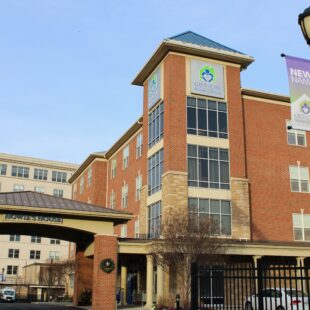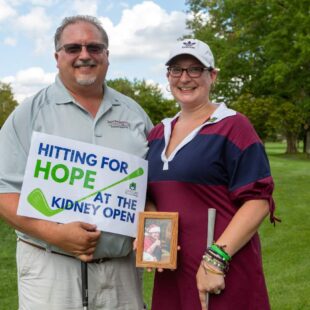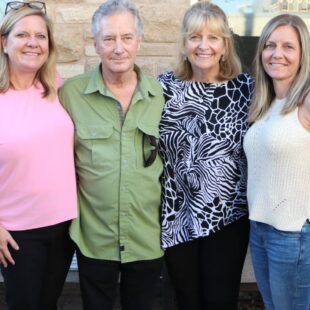A heartfelt thank you goes out to all the exceptionally talented artists who have shared their creations for this special fundraiser.

The voting period will close on April 30, 2024. Submission Theme Prompt: “Kindness through Giving”
Your generous contributions to this contest will play a vital role in ensuring the House can continue providing affordable lodging, meals, transportation, and supportive services to transplant patients and their families who travel to Philadelphia for crucial, life-saving medical care.

Untitled
by Patricia Pavlick
“What better way to give kindness than with a single flower? You do not need a whole bouquet to impress someone’s heart. One single flower can mean the world to someone having a bad day. Kindness is not expensive. It just needs to come from the heart.”

Postcard
by Jeff Feeny
“Receiving a “Postcard” from a loved one is always a pleasant surprise. The sender takes the time to find a special card and carefully hand writes their message in the available space. They talk about the wonderful places they are sending from and want to share their experiences with you. This written act of kindness instantly transports the recipient to a different place and time where they feel connected and loved. My mixed media painting titled “Postcard” symbolizes this lost art of giving and sharing. I took a photo of my artwork and subtly added the GLHH logo. Then I wrote a paragraph about why I chose this subject, albeit from the thoughts of a young person. The two pink heart gems were added last to represent the circuitous journey the postcard makes.”
Medium: Mixed media painting

Tree of Life Cares are Future
by Laverne Clark
“I’m LaVerne Clark, heart transplant recipient 12/03. I guess you can say I’m a big supporter in sharing my GOL story. I love going to the hospital and talking to the many doctors and nurses, about how important their jobs are. My goal is to make people think about life after death and how they can save lives by becoming a donor. I would just like to give hope to someone waiting for their gift of life, a second chance.”

Angels Wings Brings Many Blessings
by Laverne Clark
“When a person dies or gains their wings by becoming a organ donor. That one person can bless so many people, this is all apart of “Kindness through Giving”. What’s a better gift to give.”

Early Hudson
by Felicia Casey
“I offer them as reminders of our personal places of joy. Many find the ocean, travel and the earth’s majestic forests, to be gift churches for the soul. Each of us has a specific yearning to find and be comforted by that one place that makes us feel so good. It is kindness to help each other find these good places to rest.”
Medium: Mixed medium on paper

Earth to Sky
by Felicia Casey
“I offer them as reminders of our personal places of joy. Many find the ocean, travel and the earth’s majestic forests, to be gift churches for the soul. Each of us has a specific yearning to find and be comforted by that one place that makes us feel so good. It is kindness to help each other find these good places to rest.”
Medium: Mixed medium on paper

Ocean One
by Felicia Casey
“I offer them as reminders of our personal places of joy. Many find the ocean, travel and the earth’s majestic forests, to be gift churches for the soul. Each of us has a specific yearning to find and be comforted by that one place that makes us feel so good. It is kindness to help each other find these good places to rest.”
Medium: Mixed medium on paper
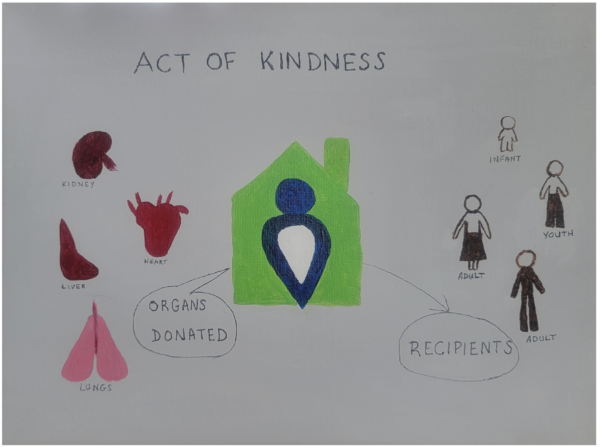
Living Through Giving
by Karen Carns
Kindness through Giving is shown in many ways, but my choice this time is to show the generous organ donations that people give from their hearts. The Gift of Life House represents the means by which organs are procured and given to those in need, a real gift of life.
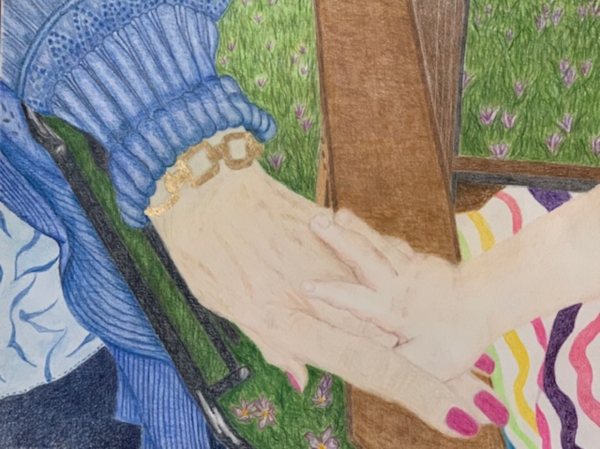
Hands Across Time
by Patricia Busarello
“Kindness through giving someone a moment of our time can make all the difference in how their day unfolds. It may be a smile or the touch of a warm hand. This work is colored pencil with gold leaf. It is based on a photo of my mother with Emily, one of her many great-grandchildren.”

Hearts and Love
by Rejena Buckley
“My husband received a heart transplant from Jefferson Health in 2023, he spent most of the year in the hospital and then the rehab facility. Our family has stayed at Howie’s House, we engage in support groups and various other activities with GOL. We have seen firsthand how the impact of volunteer support and funding is key to the needed strength and support for both patients and their support families during these journeys. The hearts in this painting signify the gift of new life my husband received from the heart transplant but also the hearts of so many who touched him along the way. The white marks, swirls and dots signify the challenges – ups and downs, the curve balls, the blood, sweat, tears, surgeries, medications, support systems, and procedures we have faced yet overcome with the strength we have received from all the wonderful support, care, actions of the medical staff, support teams, friends, and family along the path. We are grateful for the kindness of others that allows us to all have a happy life. Noteworthy recollection while painting this piece were the kind words of thanks my husband shared with the transplant surgeon during the hospital recovery for his new heart; the surgeon’s humble response, “that’s my job, just do something good with it!”. This is our reminder of the love received with this new heart through the kindness of the people that surround us. A little love of what we do each day gives love to all in many ways.”
Medium: Acrylics on Canvas
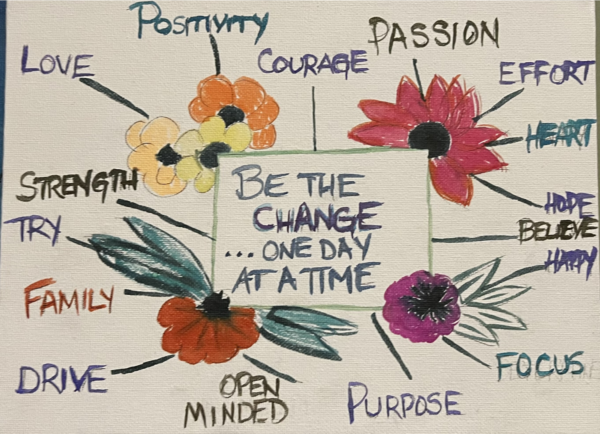
Be the Change
by Rejena Buckley
“My husband received a heart transplant from Jefferson Health in 2023, he spent most of the year in the hospital and then the rehab facility. Our family has stayed at Howie’s House, we engage in support groups and various other activities with Gift of Life. The Gift of Life services are keys to maintaining strength, stability, balance and minimize financial strains associated. As my husband continues to recover, I painted this to remind him of the journey…one day at a time. Every positive thought and act of kindness given and appreciation for those received strengthen him on this journey of life. I also added flowers as I love gardening and cutting our fresh flowers for him, however after transplant he can no longer have fresh flowers, therefore this was my act of giving beautiful flowers for him to enjoy. It’s the little things that become big gifts!”
Medium: Acrylics on Canvas

Light of a New Day
by Rejena Buckley
“My husband received a heart transplant from Jefferson Health in 2023, he spent most of the year in the hospital and then the rehab facility. The cost associated with traveling to the city, the travel time, the need to have close resources, support facilities/people as well as food on the go can be incredibly draining financially as well as mentally and physically for patients and caregivers. Our family has stayed at Howie’s House, we engage in support groups and various other activities with GOL. We appreciate the services and are thankful for the love and support we have received from the community and want to give back. I painted this picture as I looked out of my husband’s rehab window at night overlooking the Philly city lights. It looked so bright and vibrant. I am grateful and appreciate every day looking out the window into the city lights thinking of the new life, new light, new day the gift of kindness from our donor family and transplant team have provided us.”
Medium: Acrylics on Canvas

Sunrise on the Beach
by Mindy Ritzman
“Thanks to a generous organ donor, I received a kidney transplant in September of 2019. A few years ago, I took up a hobby called diamond painting. Recently, I gifted my largest custom diamond painting to a very dear person, my transplant nurse. He captures beautiful pictures on his way to work in the morning, and what better way to display them than through a custom diamond painting. Taking nearly a year to complete, each diamond drill was meticulously placed on the canvas and mounted on a board. The nurse supported me through the highs and lows of my transplant journey and experienced a significant loss last year, the loss of his wife. When I learned about this, I realized that this diamond art piece held much more meaning than just being a gift. I don’t refer to this piece as a work of art because it’s truly a work of heart. What you put out into the world has its way of coming back to you!”

Remy
by Nicole McGonigal
“For the past year, I have been getting to know horses at a wonderful establishment. When I first arrived, I was nervous to be around such large creatures. But as I grew to know them more, my nervousness disappeared as I found these beautiful horses to be so gentle, kind, and giving. The horses were offering an opportunity for my child to learn, become brave, and be more comfortable in her skin. They were allowing me to learn more about animals and how to care for them. They are so very patient with us as we get to know them more. I appreciate the kindness they give us each time we visit.”
Medium: Graphite drawing

Kindness Giving Art Angel
by Suzanne Mancuso and Katelynn Mancuso
“This is a joyful art angel the background is created by Katelynn who makes autistic abstract art in acrylics. The foreground is an acrylic overlay created by Suzanne. She guards the world and her values are kindness giving and love.”

Warmth
by Carol Taylor-Kearney
“This painting is based on a real-life photograph taken at a local fair’s Pet Show. Among the participants was this foundling, a very young kitten, and her rescuer. You can sense the devotion between the two, an exchange of warmth and kindness in giving.”
Medium: Oil on canvas

Snuggle
by Carol Taylor-Kearney
“This painting is based on a real-life photograph of two sisters readying for a nap. As the older sister snuggles her baby sister, and the baby sister snuggles her doll, we sense the gift of kindness that personal contact, a touch, a hug, brings to others and ourselves.”
Medium: Oil on canvas
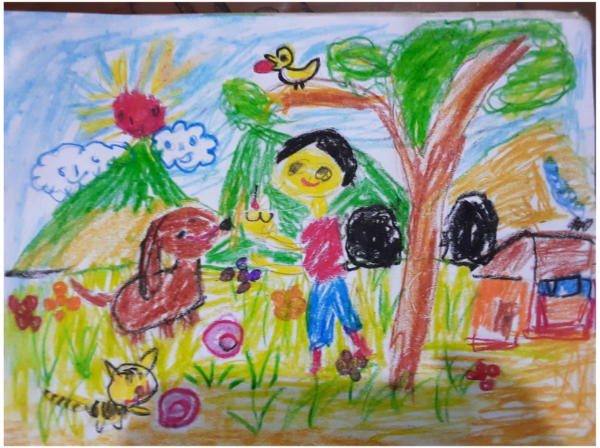
Untitled
by R.M. Thejan Kovider Rathnayake
“Being kind to the poor and helpless animals by giving foods to fulfill their hunger.”

The Path
by Liz Nathan
“This piece is titled ‘The Path’. It’s a special place I’ve been to numerous times. I always think of nature as a powerful healing force. I think the image especially represents a serene and supportive environment. When you allow yourself the gift of calm reflection you are engaged in self-care and being kind to yourself.”

From Loss, Comes Hope.
by Kelly Brown
“My name is Kelly Brown and my son Matthew received a heart transplant when he was five, almost ten years ago. He is thriving with his new heart. We live in Virginia and we travel to Philadelphia quarterly for follow-up appointments with his transplant team. We always look forward to staying at Howie’s House. For the past ten years, Howie’s House has been our home-away-from-home. The wonderful staff and fellow guests have made our transplant journey much less stressful. Thank you, Gift of Life!
My painting depicts the transition from the darkness and pain of the loss of life to the brightness and hope of a second chance at life for the recipients.”

Moon and Stars
by Estelle Carraz-Bernabei
“Love you to the moon and back. Kindness through Giving. LOVE The universal language . We all need more love ❤️ moon and stars represents that LOVE is far and wide as big as the Moon and as far as the stars.”
Medium: Painting acrylic and oil

Orchid Variation 2
by Sandra Benhaim
My watercolor and charcoal on paper painting, Orchid Variation 2, is my entry for submission to the “Kindness through Giving” art contest/fundraiser. I’m offering and giving this visual still life representation of a spray of small orchid flowers as a hopefully uplifting gesture of kindness. I learned of the contest/fundraiser through my friend Carol Taylor-Kearney, who had the connection with Gift of Life Howie’s House when she underwent a kidney transplant.
Medium: Watercolor and charcoal on archival paper

Teddy my Love
by Alainna Swift
“This painting displays my desire to create a fun, cutesy, and comforting image. My piece is a multicolored, adorable teddy bear with wings! I am fond of many creative styles, and as of lately I have been interested in adorable images and products such as stuffed animals, pastel colors, and bejeweled things. I typically do not always create these kinds of things, so I wanted to fully dive in and express myself with my current cute interests. It has been freeing and comforting making the piece, and seeing its final result makes me smile. To me, teddy bears represent a gift of love. They are fondly regarded as a token of love, for any person or age. To receive a teddy bear, is to receive love. And for my submission, I choose to give to you the kindness and comfort that a teddy brings. I am connected to Gift of Life Howie’s House through my mother who is a two-time kidney transplant survivor, and dear family friends, Bill & Mary Corazo.”

Renaissance, Study #2
by Nancy St. John
“I began painting in 2020 while home waiting for a heart transplant. It was a fun creative distraction during the long days of COVID pre-transplant isolation. I have always had a great appreciation for beauty: in nature, in art, in my surroundings. Beauty brings me joy. It grounds me. When spending time in my garden became too much for me physically, my painting took on an even deeper meaning. It was a wonderful focus as I waited for the call for a new heart, a call that I wasn’t sure would ever come. In the Spring of 2022, still waiting for a heart, I stopped painting. I simply did not have the energy for it. This was especially difficult because the spring had been “me time,” time in the garden. Instead I was spending my days mostly on the couch, trying to focus on the beauty around me as I had no ability to create it on my own in the garden. And then, on July 6, 2023, 3 years after I began the journey, I received the call. A family had made the most unimaginable gift possible out of the most unimaginable tragedy. It was several months after transplant that I picked up a brush again. Like my walking, I started small. And like my walking, the momentum grew. This painting is titled Renaissance, Study #2. Renaissance as a recognition of rebirth, and #2 because of the new chance I was given to live as the result of receiving the most extraordinary gift of new life. Surreal, beauty and color are what I felt at the prospects of a second chance, and it is what poured out of me onto the canvas in Renaissance, Study #2. The colors and shapes represent my experience: the beauty of the gift I received, the incredible doctors and nurses who cared for me, the energy returning to my body and the joy returning to my soul. My work on canvas is similar to my beginning to live again. Learning as I go, appreciating every moment of joy and beauty that comes in both the challenges and the gifts that each day brings.”

Untitled
by Mia Corazo
“I believe that pets, especially dogs, show what kindness is all about. My dog gives unconditional love everyday. She doesn’t ask for promises or rewards. She knows when I’m feeling sad and comforts me without being told. She shows me kindness without hesitation. When she sits next to me and simply puts her head on my lap. I see love and kindness in her beautiful, caring eyes. It’s a feeling second to none. It’s a mixture of kindness and love. I’m very fortunate to have such a kind, caring friend.”
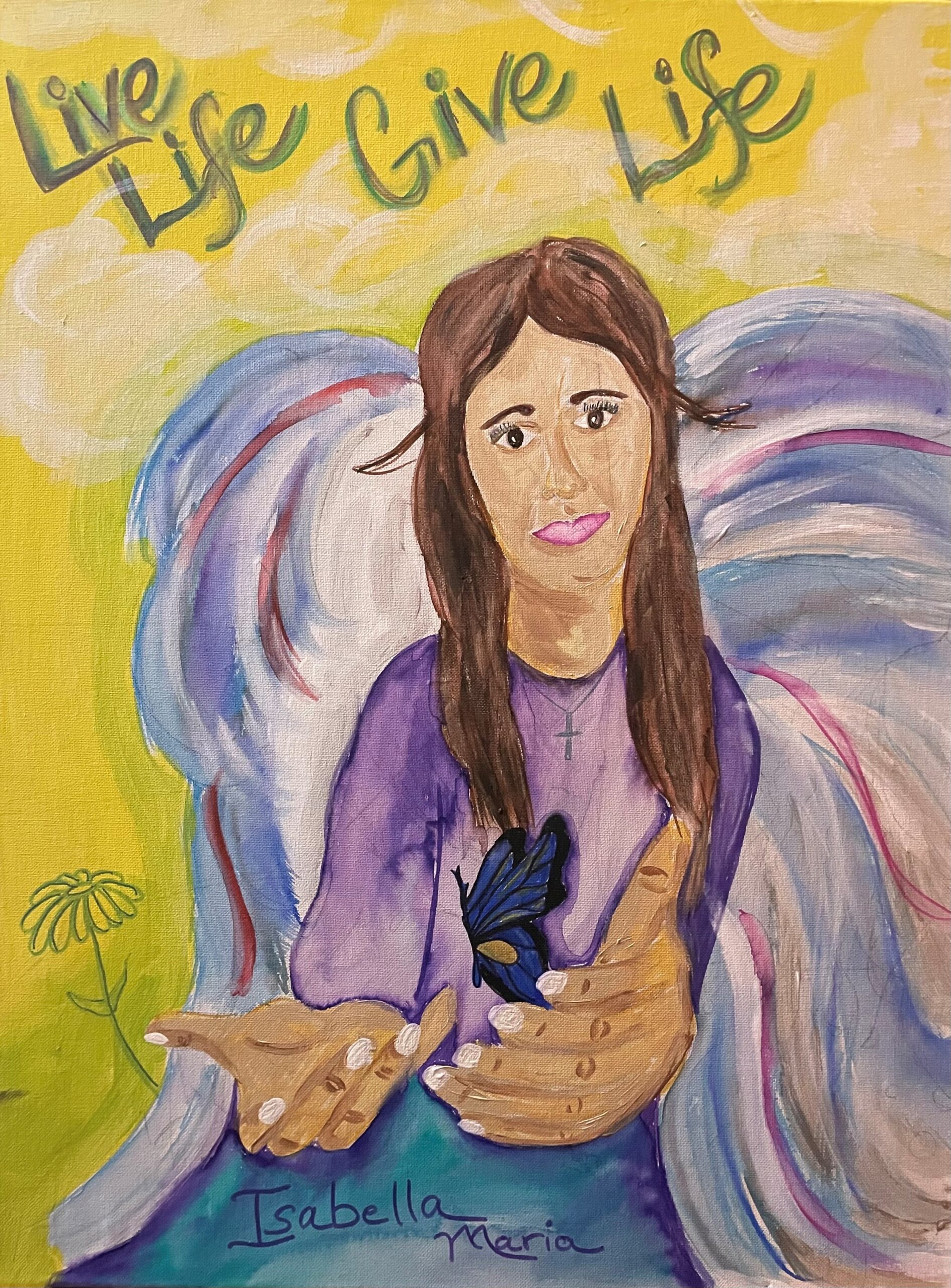
The Giving Angel
by Jamie Dacanay
“This original artwork done in acrylic and watercolor represents Kindness Through Giving by showing Isabella Maria who died at the young age of 18. Her parents chose to donate her organs, turning tragedy into a way to give back and save others. The butterfly represents new life. Her hands are extended outward as to give life to others. Her family and friends have often seen butterflies as a reminder and comfort, knowing that Isabella is all around us. She has angel wings. Family and friends will continue to walk each year in Isabella’s name for Gift of Life.”
Medium: Acrylic and watercolor

Circle of Life
by Maureen Bowie
“Life is represented as a circle because of its constant loop. Using abstraction as a form allows for the expression of a myriad of situations and energies. This painting “Circle of Life” represents family, friends, and the bonds we have tied with anyone who has entered one’s circle throughout life. The patterns and faded circles represent choices which have become the fabric of our lives. The rusted circle symbolizes the hardships and challenges one might endure yet remains, providing strength and unity through love, compassion and kindness.
My affiliation with Howie’s House started in 2011 shortly after the house was built. As a team my family started volunteering for the house’s Home Cook Heroes Program. It was through my nephew Kevin Spiers, an organ donor, that we made a connection with the house. Only 22 years of age when he passed, Kevin had a compassionate and abundantly giving and kind spirit. Each month our group (Team Spiers) plans and prepares a meal for family house guests. This enables us to celebrate Kevin’s Life and keep his spirit and memory alive. When we started doing this we had no idea of the grace it would provide us as well as the impact it would have on the community.”
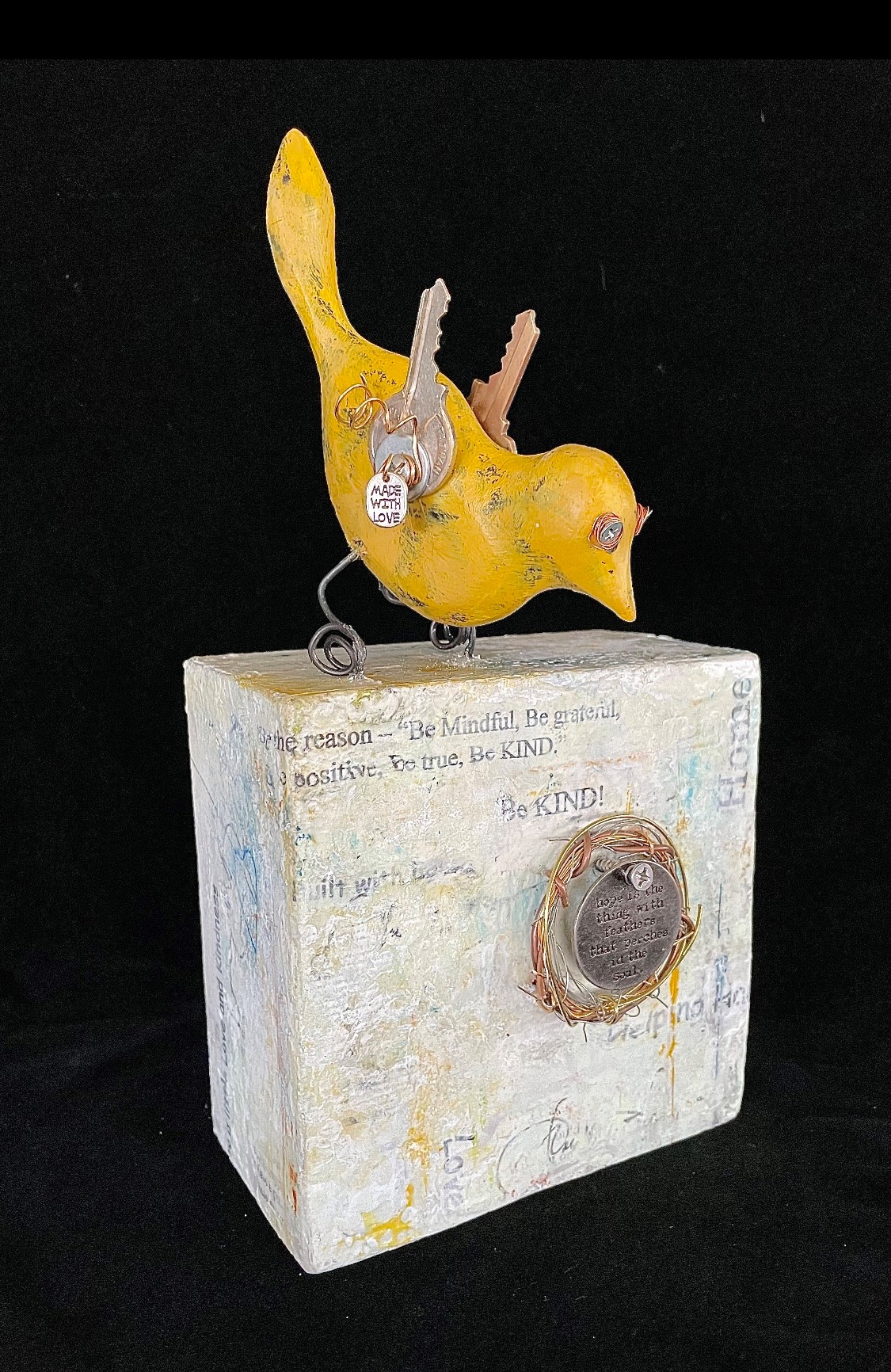
A Ray of Hope
by Maureen Bowie
Hope is the thing with feathers
That perches in the soul,
And sings the tune without words,
And never stops at all…
“Kindness is akin to a beam of light, bringing hope and optimism in difficult times.
This 3 dimensional painting is made of wood. The bird is carved then decorated with wire and found objects to tell its own story.”
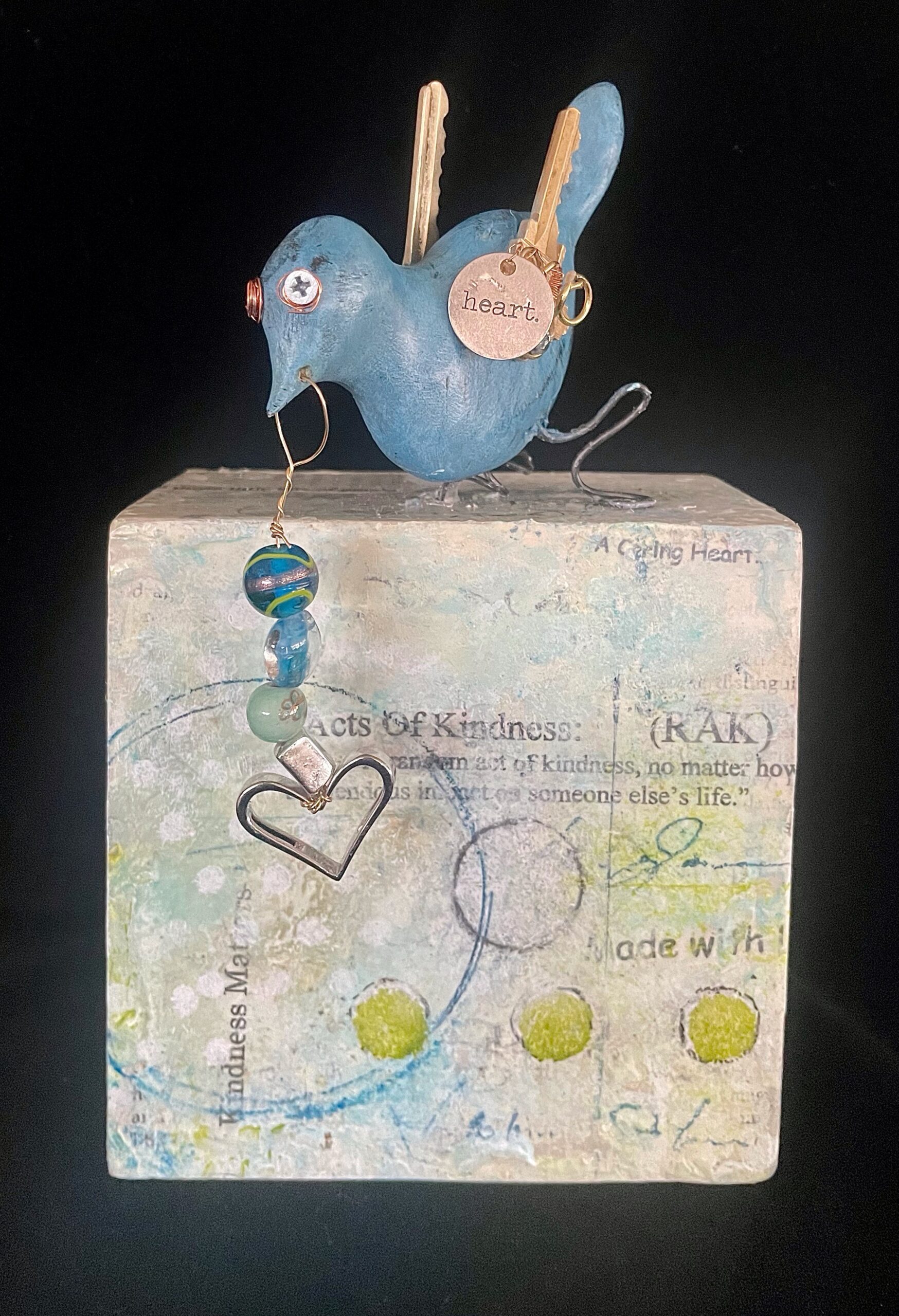
Acts of Kindness
by Maureen Bowie
“Fragile in nature, tender is the heart of the little bird that sings. Bringing joy, love and kindness to all who witness his presence. This 3 dimensional painting is made of wood. The bird is carved then decorated with wire and found objects to tell its own story.”

Untitled
by Lauren Bosco
“While a simple painting of a boat on the river at first glance doesn’t seem to fit the Kindness through giving, for my daughter nothing else could represent the theme more. This was painted by my daughter in honor of her late grandfather, a Gift of Life Donor. His eyes were donated to a farmer not to far from us. Not only did he leave this world showing one of the biggest kindnesses you can give, an organ, he share his love of the woods. Of fishing. Hunting. Nature. And through that active of kindness and sharing my children cherish nature in the most amazing ways. Picking up litter, feeding animals, sharing stories, planting flowers, painting pictures of my dad’s most cherished hobbies. “
Four-year-old Layla stayed at Gift of Life Howie’s House with her family while her father received care in the hospital.
Layla had one big wish for Christmas: for her father to receive his life-saving heart and kidney transplant, something he has been waiting for since August 2023.
We are thrilled to share that Layla’s Christmas wish came true, and her father, Eric, received the best gift of all: the gift of life. Thanks to a generous organ donor hero, Eric received his heart and kidney transplant last Christmas.
Layla along with her mother, grandmother and baby brother were provided safe, peaceful lodging and access to all the other services of the House: home-cooked meals, a fully stocked pantry, transportation to and from the hospital, an on-site social work team, and a whole community of caring people.
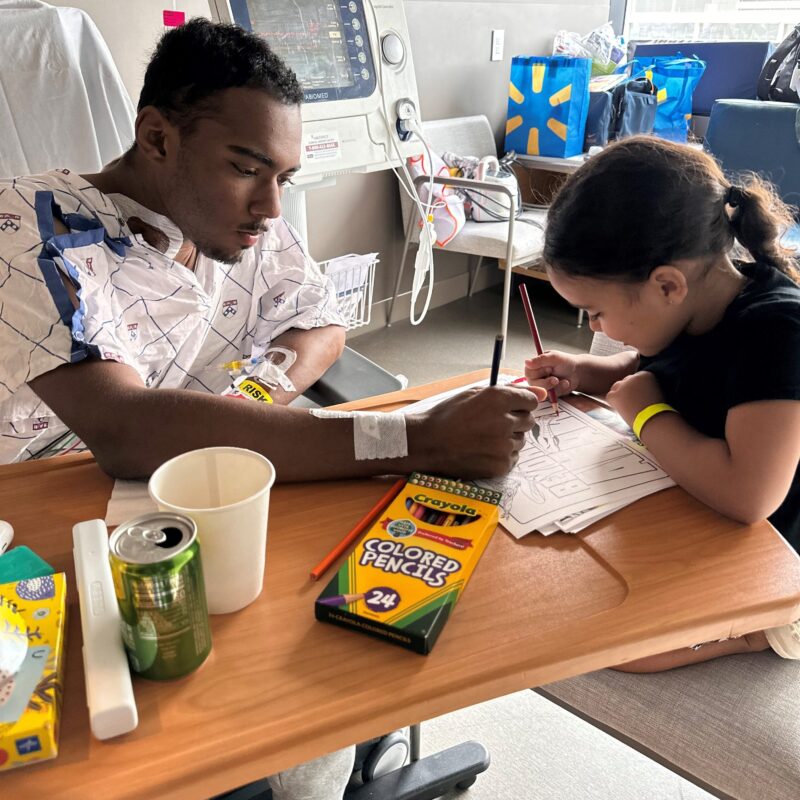
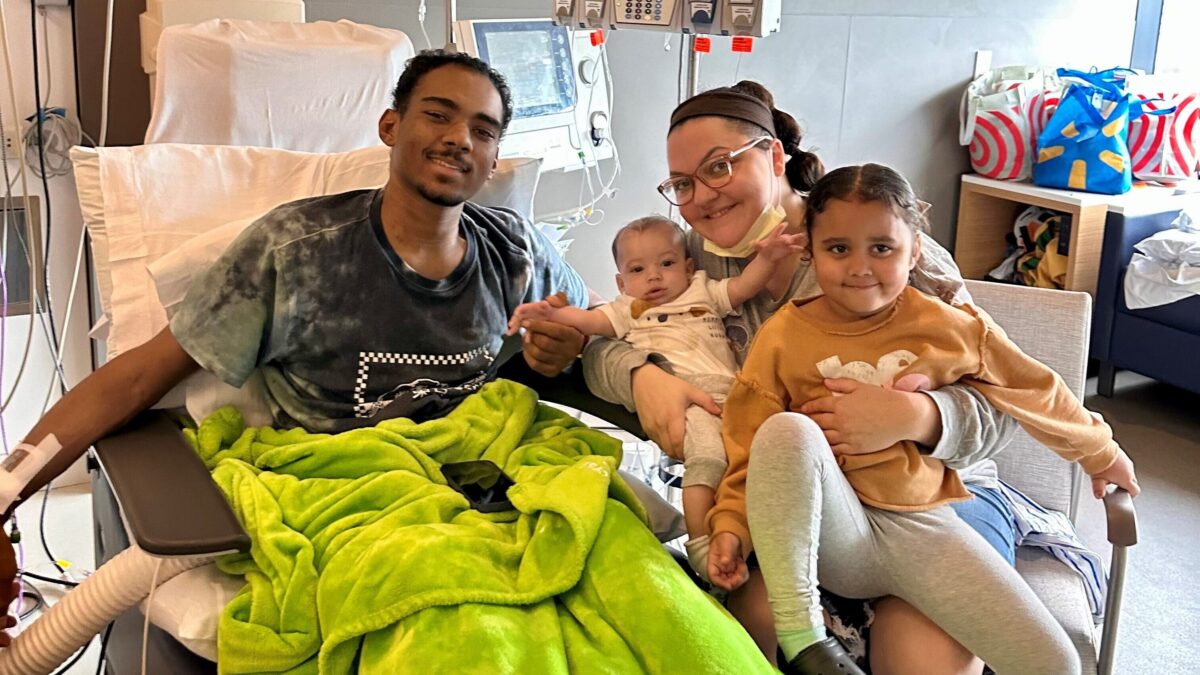
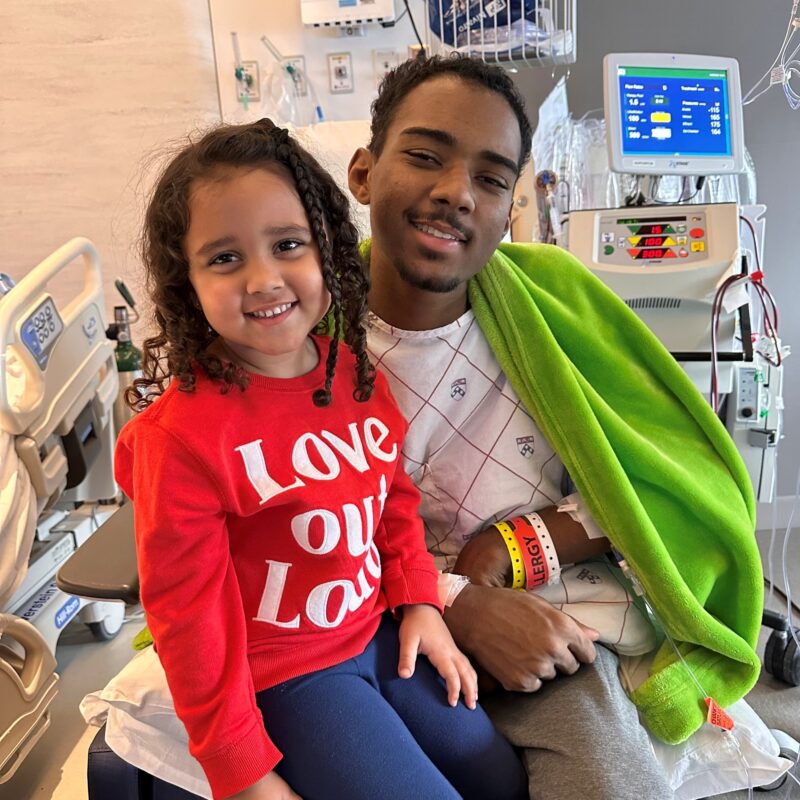
HELP CONTINUE THE COMMITMENT TO SAFETY this Spring by supporting the enhancement of the security system at the House.
Families traveling from far away for medical care face numerous concerns while navigating the challenging transplant journey. For those coming from out of town, feeling safe and secure while in an unfamiliar environment such as a large city, is essential for their peace of mind.
At Gift of Life Howie’s House, ensuring guests feel safe during their stay has always been a top priority and an integral part of the overall mission. That’s why multiple measures are in place to make sure guests feel as comfortable as possible when walking through the House doors.
From the secure perimeter gate that encloses the facility to the overnight security guards and surveillance system, the goal is to ease the mind of the families who stay at the House as soon as they arrive.
As part of our commitment to providing the safest environment possible for guests, House staff continuously assess our systems for the most up-to-date improvements.
This year, an upgrade to the existing security camera and public announcement system is planned, and the House is calling on the support of the community to help complete the project in 2024.
Your support of this important project will help families like the Bachers, who said they relied on the safety and security that the House provided during their stay.
Mike Bacher was diagnosed with cardiomyopathy over 16 years ago, a heart disorder which he contracted from a viral infection. Mike and his wife Jo-Ann live in Lewes, Delaware, a rural beach community over 2 and half hours away from Philadelphia.
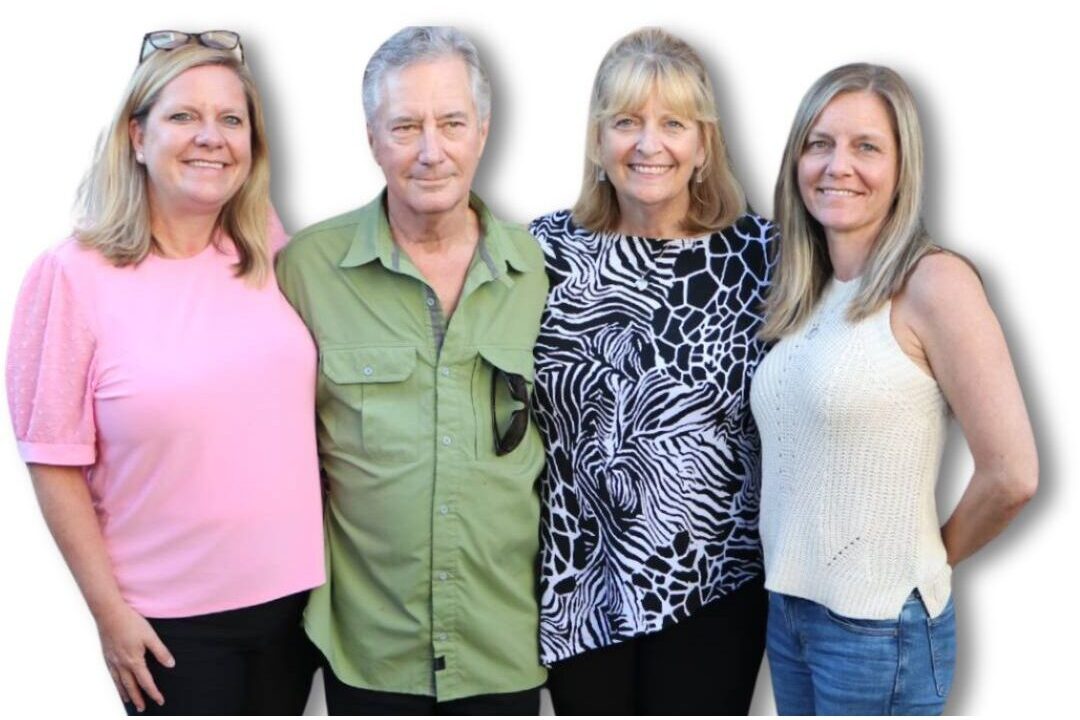
For years, Mike managed the disease, until his condition started to quickly worsen at the beginning of 2022. Mike’s doctors suggested he get listed for transplant, so they made the journey to Philadelphia to begin his evaluation.
Traveling into the city from a rural setting, they didn’t know what to expect before arriving to the House. Mike shared that as soon as he saw the facility, he knew he made the right choice.
“It was a huge relief. I couldn’t have imagined anything nicer and safer. I was pretty apprehensive about coming into Philly at all, and I didn’t know what area we were going to be in until we got there,” Mike said. “We were pleasantly surprised to find what a nice place it was.”
“I couldn’t have imagined anything NICER and SAFER.“
Mike’s wife, Jo-Ann, said that the security measures in place were one of the first things she noticed.
“At first, I noticed all the security cameras inside, I wasn’t used to the place and didn’t know anyone so that made me feel very secure. It was like being in a hotel…even pulling into the gate and not having to worry about where I was going to park my car made a huge difference.”
After Mike was admitted to the transplant waiting list, he didn’t have to wait long. Only 11 days after being listed, Mike received his life-saving heart transplant thanks to an organ donor hero.
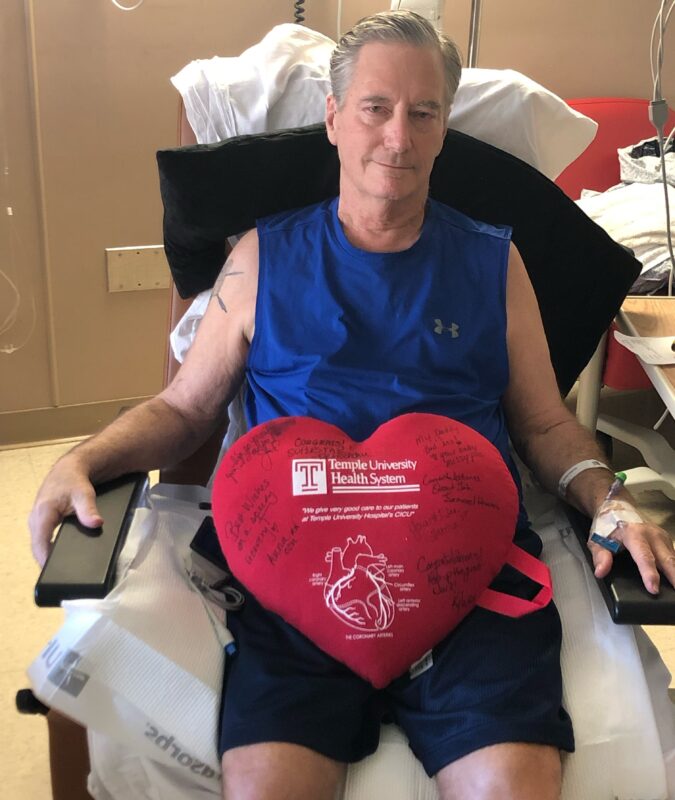
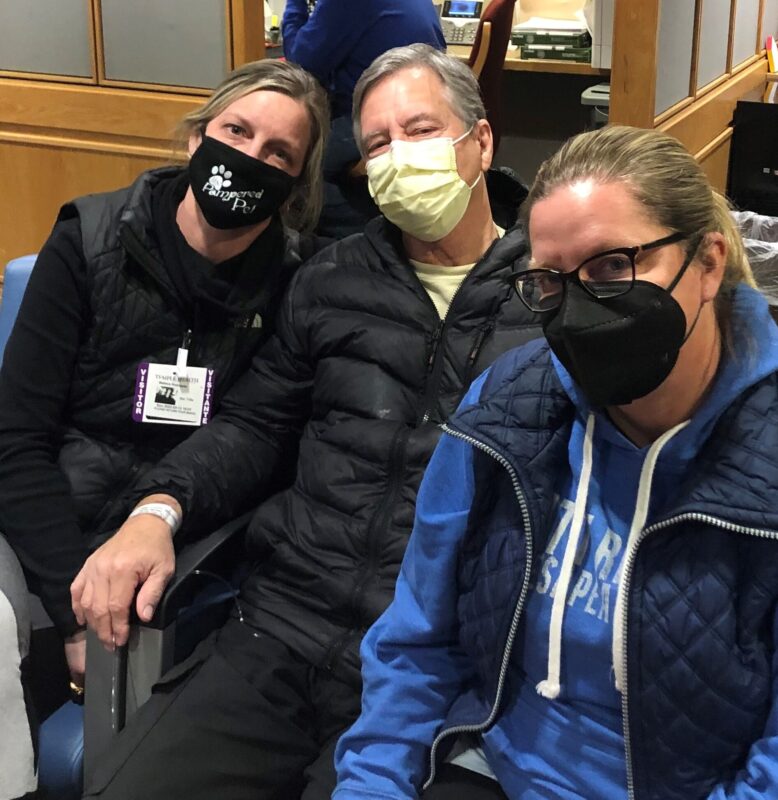
While he recovered in the hospital, Jo-Ann remained at the House to stay close to him while their two daughters, Heather and Melissa, would visit periodically to provide support.
Mike said that the peace of mind the House brought him made all the difference in his recovery.
“This facility was a lifesaver, providing a safe environment for my family to allow them to visit through this whole ordeal. I spent a total of 56 days in the hospital, and they were there through almost all of that,” explains Mike.
Mike’s family was so grateful for the services the House provided that they have since given back to the mission by hosting a successful Facebook fundraiser, serving a meal through the Home Cook Heroes program, and now support the annual fund!
“This facility was a LIFESAVER, providing a safe environment for my family…”
Post-transplant, Mike and his family have been traveling as much possible, including a recent trip to the Floridia Keys that had been rescheduled twice due to his health complications. Jo-Ann and Mike say they are trying to travel as much as possible and make the most of every day.
“We want our donor to know that we’re not wasting one day, we’re living every day to the fullest because you just never know when it’s going to be your last,” Jo-Ann says.
THIS SPRING, HELP SUPPORT THE COMFORT OF FAMILIES LIKE THE BACHERS
by supporting the upgrade of the security camera and public announcement systems.
This project will further modernize the current security camera system at the House, allowing for enhanced picture quality, more centralized monitoring, better views of the building, and more. It will also include an upgrade to the current public announcement system within guest rooms, simplifying the process to make guest and safety announcements.
Please consider making a tax-deductible contribution today to help reach the goal of $40,000 to complete this important project.
Gifts of all sizes are needed and appreciated. As Jo-Ann says, “Even a small gift goes a long way.”
Click Here to make your gift today!
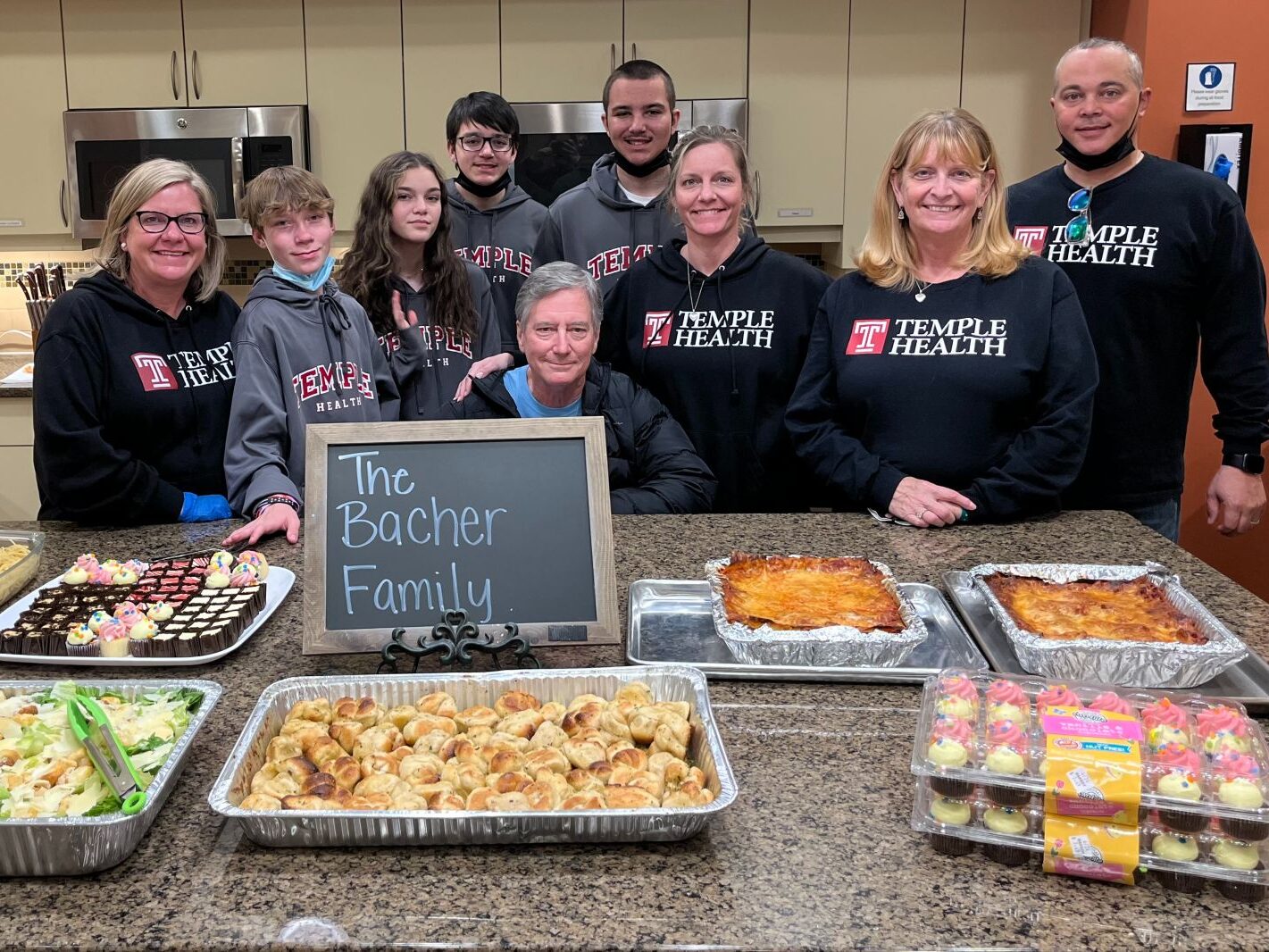
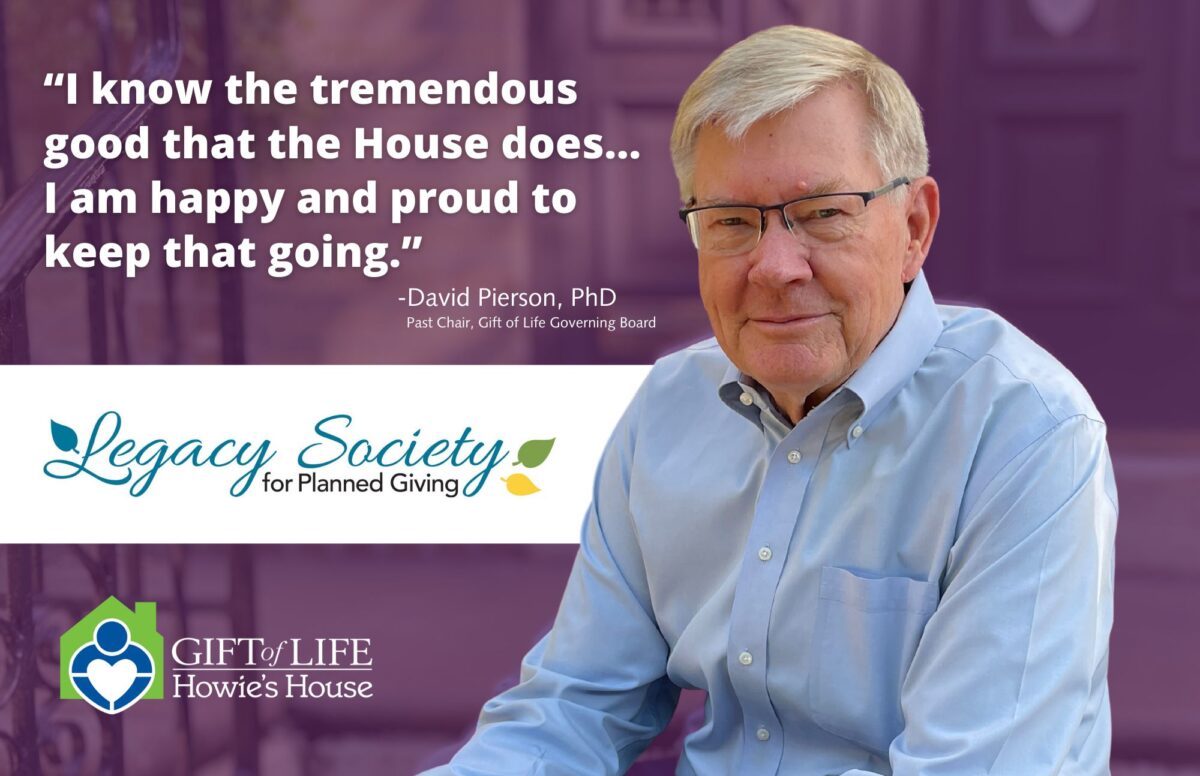
When David Pierson became a donor family member in 2004 after losing his wife, he witnessed firsthand the compassionate work that is synonymous with the Gift of Life mission.
It wasn’t until he began serving on the governing board that he truly understood the full scope of what Gift of Life Donor Program and its affiliates accomplish. This experience also gave David greater insight into the services and care Gift of Life Howie’s House provides to transplant families. “Having been deeply involved with the organization, I witnessed the tremendous good that the House does,” he says.
Even after his board service concluded, David chose to remain close to the Gift of Life mission. He decided to include the House in his estate plans to help ensure that families will continue to benefit from the House for years to come.
“The House truly provides families with an opportunity to be together during challenging times. I am happy and proud to keep that going.”
Please join David Pierson as a member of the Legacy Society for Planned Giving.
We also invite those who have already included the House in their will or otherwise made a planned gift to inform us so we can celebrate your commitment. The story behind your generosity may also inspire others to take action.
You should consult with your tax advisor to determine the degree to which your gift may result in tax advantages to you, your estate, and your beneficiaries. The official registration and financial information of Transplant House d/b/a Gift of Life Howie’s House may be obtained from PA Dept. of State by calling toll free 1.800.732.0999. Registration does not imply endorsement.
Caregiver Lifeline Spotlight
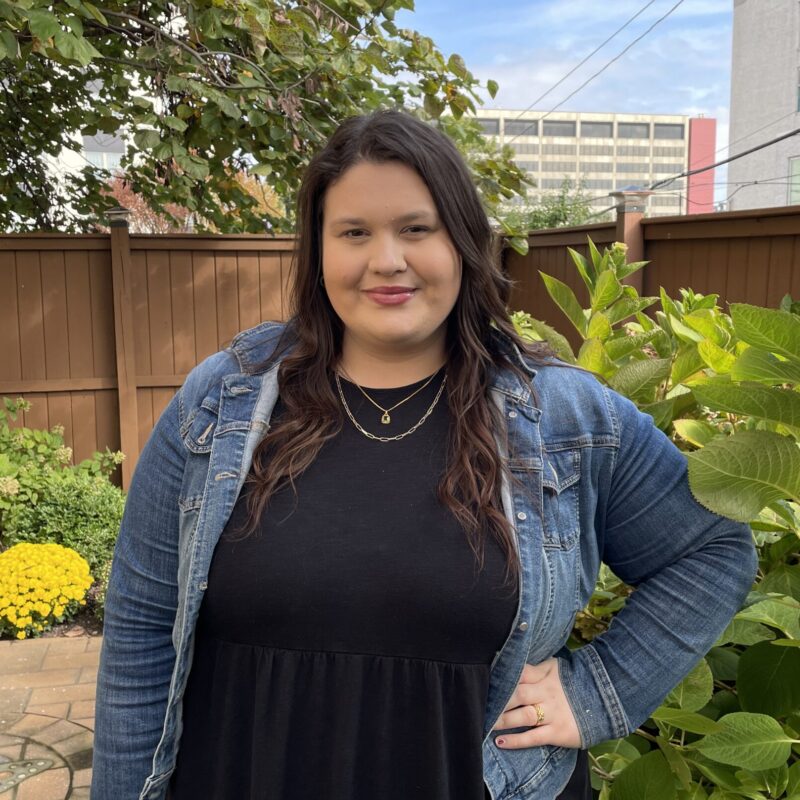
Mia Moore, MSW
Social Worker
Gift of Life Howie’s House
During their transplant journey, many patients and caregivers experience financial stress. Chronic illness and transplants often provide little time for patients and their families to plan.
Causes of Financial Stress
Stress can often be defined as a state of worry or mental tension resulting from a challenging situation. It can impact your emotional and physical well-being in many ways, such as irritability or fatigue, and can potentially lead to anxiety or depression. With financial stress there is an emphasis on being in a state of worry or having mental or emotional strain because of issues such as budgeting, debt, or upcoming large expenses.
Many situations may arise that can cause financial stress during the transplant journey including reduced work hours or income, unexpected healthcare costs, increased travel or living expenses, lack of savings or
unforeseen emergencies.
Symptoms of Financial Stress
Symptoms of financial stress may look very similar to some reactions to your everyday stress or worries. However, due to this stress being a result of financial issues your symptoms have a direct impact on your feelings surrounding your finances. Some common symptoms are :
- Feelings of guilt when needing to spend money
- Difficulty falling or staying asleep
- Lack of joy for things that you used to like doing
- Isolating yourself from others or avoiding phone calls
- Hopelessness regarding the future
- Feelings of shame
Ways to Manage Financial Stress
Consult with your hospital social worker to identify transplant-specific
financial resources
- Reach out to your bank or loan companies for resources for those
experiencing financial issues - Create a new monthly budget based on your income and new expenses
- Tend to your physical and emotional health like you would for
other stressors. Talk about it with close family or friends, reach out
to support groups and networks, talk to a counselor
Transplant Resources
Transplant costs vary and it is common for patients to use multiple resources to help pay for unexpected costs.
If you have issues obtaining your medications, concerns about medical costs or future coverage, or the cost of medical equipment, reach out to your transplant or dialysis social worker. There may be region-specific or organ-specific grants that you or your loved one may be eligible for.
Fundraising is also a great resource for supporting costs related to lodging, travel, and other medical expenses. The following organizations can aid with getting started:
- Help Hope Live: helphopelive.org or Phone: 800-642-8399
- Children’s Organ Transplantation Association: cota.org
or Phone: 800-366-2682 *Specifically for children and young adults
Stress is a normal part of life and finances are a common stressor for many transplant patients and caregivers. If you have trouble navigating some of the resources listed above, please email:
caregiverlifeline@giftoflifehowieshouse.org
1 BetterUp, Financial stress: What’s money got to do with sanity?, 2021: betterup.com/blog/financial-stress
2 Health Direct, Financial stress and your health, 2023: healthdirect.gov.au/financial-stress
Caregiver Lifeline Spotlight

Transplant patients can live for many decades after transplantation, and with that remarkable success and progress comes a need for personalized and multidisciplinary medicine that includes specialized dermatology care.
Organ transplant recipients have an increased risk of skin cancer because immunosuppressive medications that prevent transplanted organs from being rejected by the body also lower the body’s natural defenses against skin cancer. The most common type of skin cancer in transplant patients is squamous cell carcinoma. The good news is that if detected early, with good care these cancers can be managed and very often cured.
Transplant Dermatologists have a simple goal – no one should die of skin cancer after a second chance at life through organ donation.
How high is the risk of skin cancer in transplant patients?
One in five people without a transplant will develop skin cancer by the age of 70. That story is dramatically different for transplant patients. Transplant patients are 65 times more likely to get squamous cell carcinoma than people without a transplant. They are 10 times more likely to get basal cell carcinoma, the least serious type of skin cancer. And transplant patients are 3 to 4 times more likely to develop melanoma, a potentially more serious type of skin cancer.
Skin cancers in transplant patients can grow quickly and have an increased risk of spreading. That’s why having a good relationship with a dermatologist who specializes in transplant dermatology can be game changing. Prompt and expert dermatologic care, which often includes a specialized type of surgery called Mohs surgery for certain skin cancers, is crucial for transplant patients.
What can transplant patients do about the increased risk of skin cancer?
The most important thing to do to lower the chance of skin cancer is sun protection – sunscreen, sun protective clothing, hats and sunglasses. Go ahead and make that hat fashion statement. As with many cancers, early detection of skin cancer is an important factor for preventing serious complications and death. Fortunately, most skin cancers can be easily treated in outpatient settings. The most common way to treat skin cancers in sensitive areas like the face is with Mohs Surgery. Mohs offers the highest cure rate and is the most precise way to treat skin cancer with the best cosmetic outcomes after surgery.
Good transplant dermatology care also offers treatments and medications to help lower the chance of developing skin cancer in the first place.
How often should you see a board-certified transplant dermatologist after an organ transplant?
What time and experience have proven is that routine dermatology care is an essential part of organ transplant care. Every transplant patient should be seen by a board-certified dermatologist around the time of transplantation, not because skin cancer is looming, but to start learning about skin cancer and what to look for.
After that, the frequency of dermatology visits will be based on each person’s unique situation. For some, visits are needed every few months. Fortunately most transplant patients do very well with visits to the dermatologist every 6 to 12 months.
If you are a transplant patient, talk to your transplant coordinators and physicians about finding a dermatologist who has an interest in transplant dermatology. You can also look for a transplant dermatologist through the International Immunosuppression & Transplant Skin Cancer Collaborative’s “Find a Transplant Dermatologist” tool.
Learn More About Transplant Dermatology
To learn more please watch Dr. Mark’s webinar presented through the Caregiver Lifeline Program
News & Events
Stay Connected
Sign up to receive email updates featuring transplant stories of hope and ways you can get involved with the Howie's House.
"*" indicates required fields


